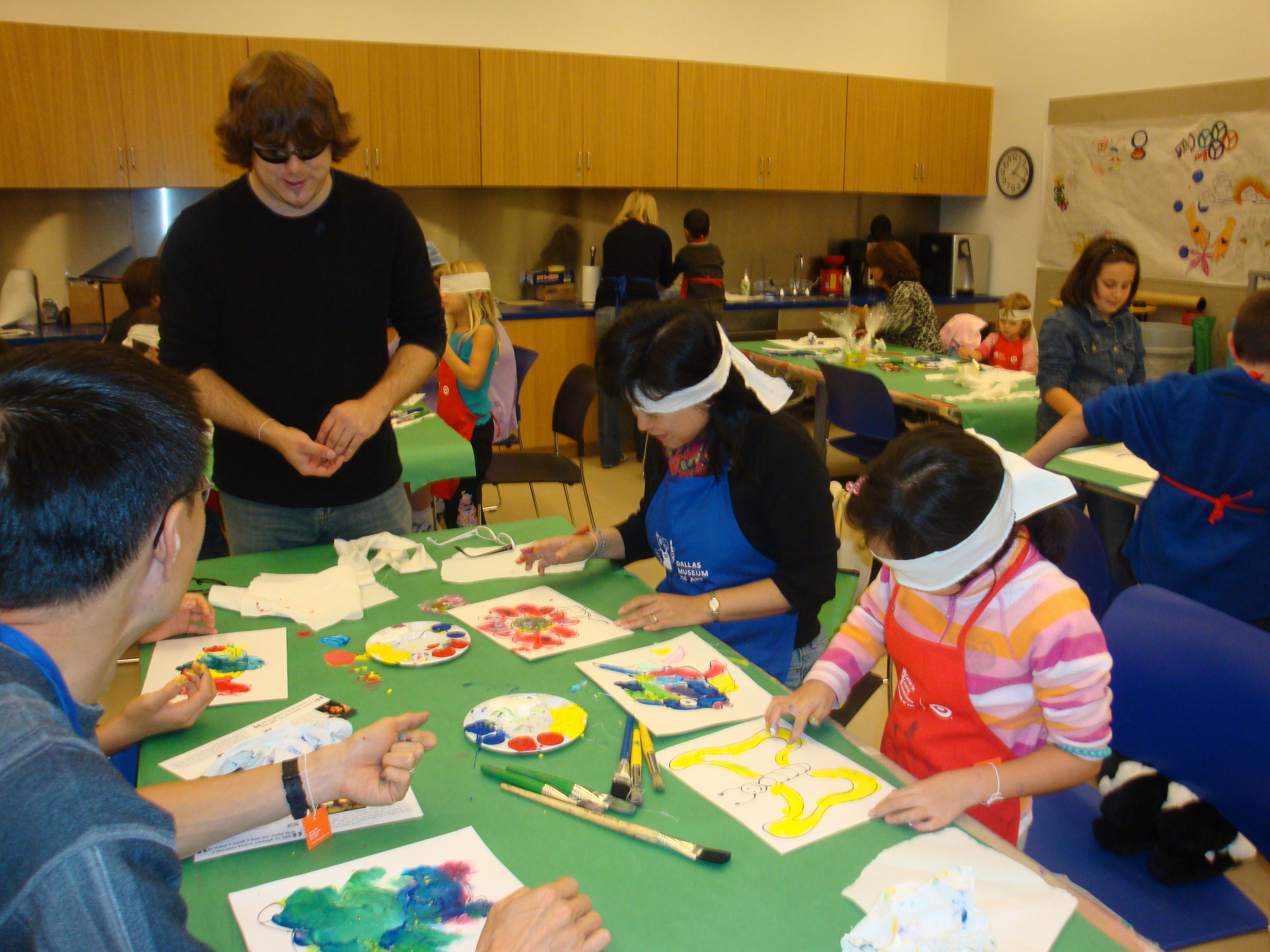Official behind-the-scenes blog of the Dallas Museum of Art

DMA guest artist, John Bramblitt, instructs workshop participants
Have you ever made an artwork blind-folded?
This past Saturday, visitors to the Museum did just that—painting purely through the sense of touch—under the skilled direction of blind painter, John Bramblitt. Bramblitt is a guest artist at the DMA in October, in conjunction with Art Beyond Sight Awareness month. Organized by Art Education for the Blind (AEB), Art Beyond Sight Awareness month raises awareness about integrating art into the lives of adults and children affected by sight loss. Bramblitt will demonstrate his process and hold another participatory workshop at the Museum on Thursday, October 29th from 6:30-8:30 in the Center for Creative Connections.
We hope you’ll join us then!
Amy Copeland
Coordinator of Learning Partnerships with Schools and the Community
Welcome to the first “Community Connection” blog post! My name is Melissa Nelson, and I’m the Manager of Learning Partnerships with the Community at the DMA. Each month, I will interview a creative member of our community and feature their responses here in a series of posts called “Community Connection”.
Meet Lesli Robertson, our first Visiting Artist with the Museum’s Center for Creative Connections. I caught up with Lesli bright and early last week, as she was enjoying the cool weather before her day got started.
What first made you want to become an artist?
I think it made sense, and it was something that was part of my nature and my world. Making helped me understand things, either about the world or myself. I didn’t have any art classes in elementary school, and in high school the emphasis of looking at artists didn’t get that much better. It wasn’t until college that I started seeing what it really was about – making art, creating art, throughout history to contemporary use. It wasn’t until then that I figured out I was an artist.
How would you describe your creative process?
I use textile-based media; I think they have the potential for communication. My work depends on where I’m at, what I’m thinking about, what’s going on. It’s very intuitive, though I make conscious decisions on material, form, how things are installed. Part of the process is looking at where you’ve come from as an artist and where you’re going. The body of work I’m now working on is a reaction to the past three years of writing, research, and studio work. It is a comment on the evolution of my artwork. The materials I use stay the same – I started working with textile-based media and concrete five to six years ago and I love those materials. They have so much content to them and apply so well to what I want to do, formally and conceptually.
Apart from creating things, what do you do?
I love working on projects with the community and looking for different opportunities for collaborations. For example, last semester I worked with the biology department at University of North Texas (Lesli is an adjunct professor of fibers at UNT’s College of Visual Arts and Design). I am also conducting research in Uganda and writing an article on contemporary bark cloth artists. I have to almost limit what I do – it is all informative but can pile up real easily.
What handmade possession do you most cherish?
I’m most proud of a handmade mat from Uganda that I bought from an artisan. It is gorgeous. It is hand-plaited in narrow strips about two inches wide, which are then stitched together, and cut into a mat of about three feet by seven feet. What’s so gorgeous is that the artisans work with two tones of color. When everything gets stitched together, it makes a pattern and it’s beautiful. It’s one of those things that you covet, and I’m glad I have it, so I don’t have to covet it anymore.
Please describe the work you’re currently doing with the Dallas Museum of Art.
I’m working on a community collaborative project. I’m asking the community to make small concrete collages that I’m weaving into small strips, which I’m using for an art installation in the Museum’s Center for Creative Connections. The idea is to work with the diverse communities that the DMA works with, and having an artwork that shows each individual that makes up this larger community. I’m going out and working with groups, and inviting people in the Museum to contribute also. The installation relates to the Materials and Meanings exhibition in the Center for Creative Connections, and the idea that materials can mean something to the person making the work of art. I ask the participants to choose materials that represent them to include in their individual collages.
To meet Lesli in person, join us for our first Thursday Evening Program for Teachers on September 10 at 7:00 p.m. Participation is free and advance registration is not required.
The Ice House Cultural Center summer camp students, Dallas ISD Talented and Gifted elementary students, Cathedral Guadalupe, and Booker T. Washington teachers are just a few of the groups Lesli is working with from July through October. Make sure you check out Lesli’s installation in the Center for Creative Connections, starting January 2010.
Melissa Nelson
Manager of Learning Partnerships with the Community